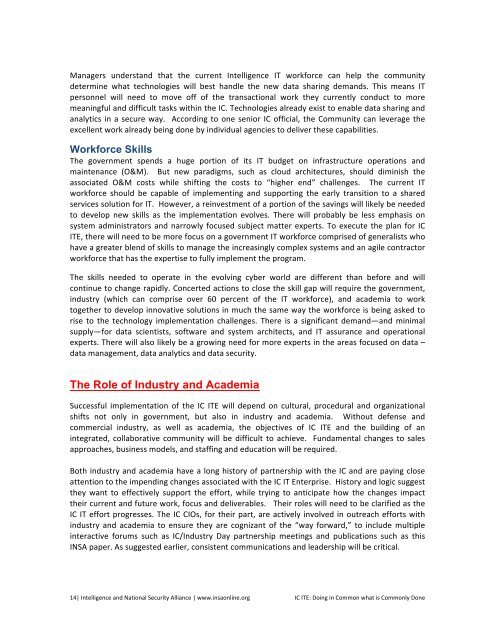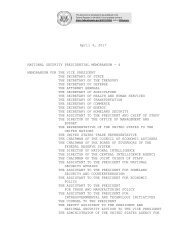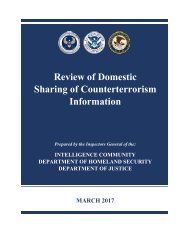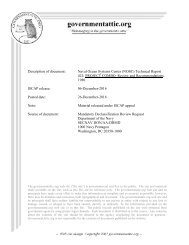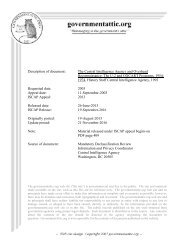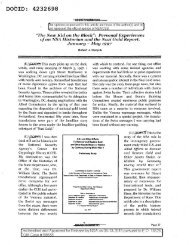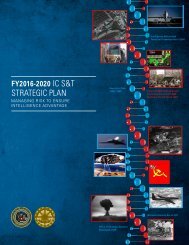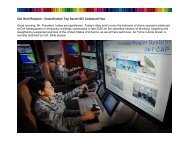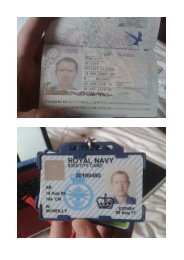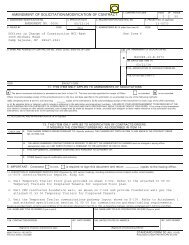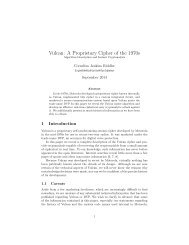insa-ic-ite
insa-ic-ite
insa-ic-ite
Create successful ePaper yourself
Turn your PDF publications into a flip-book with our unique Google optimized e-Paper software.
Managers understand that the current Intelligence IT workforce can help the community <br />
determine what technologies will best handle the new data sharing demands. This means IT <br />
personnel will need to move off of the transactional work they currently conduct to more <br />
meaningful and diff<strong>ic</strong>ult tasks within the IC. Technologies already exist to enable data sharing and <br />
analyt<strong>ic</strong>s in a secure way. According to one senior IC off<strong>ic</strong>ial, the Community can leverage the <br />
excellent work already being done by individual agencies to deliver these capabilities. <br />
Workforce Skills<br />
The government spends a huge portion of its IT budget on infrastructure operations and <br />
maintenance (O&M). But new paradigms, such as cloud arch<strong>ite</strong>ctures, should diminish the <br />
associated O&M costs while shifting the costs to “higher end” challenges. The current IT <br />
workforce should be capable of implementing and supporting the early transition to a shared <br />
serv<strong>ic</strong>es solution for IT. However, a reinvestment of a portion of the savings will likely be needed <br />
to develop new skills as the implementation evolves. There will probably be less emphasis on <br />
system administrators and narrowly focused subject matter experts. To execute the plan for IC <br />
ITE, there will need to be more focus on a government IT workforce comprised of generalists who <br />
have a greater blend of skills to manage the increasingly complex systems and an agile contractor <br />
workforce that has the expertise to fully implement the program. <br />
The skills needed to operate in the evolving cyber world are different than before and will <br />
continue to change rapidly. Concerted actions to close the skill gap will require the government, <br />
industry (wh<strong>ic</strong>h can comprise over 60 percent of the IT workforce), and academia to work <br />
together to develop innovative solutions in much the same way the workforce is being asked to <br />
rise to the technology implementation challenges. There is a signif<strong>ic</strong>ant demand—and minimal <br />
supply—for data scientists, software and system arch<strong>ite</strong>cts, and IT assurance and operational <br />
experts. There will also likely be a growing need for more experts in the areas focused on data – <br />
data management, data analyt<strong>ic</strong>s and data security. <br />
The Role of Industry and Academia<br />
Successful implementation of the IC ITE will depend on cultural, procedural and organizational <br />
shifts not only in government, but also in industry and academia. Without defense and <br />
commercial industry, as well as academia, the objectives of IC ITE and the building of an <br />
integrated, collaborative community will be diff<strong>ic</strong>ult to achieve. Fundamental changes to sales <br />
approaches, business models, and staffing and education will be required. <br />
Both industry and academia have a long history of partnership with the IC and are paying close <br />
attention to the impending changes associated with the IC IT Enterprise. History and log<strong>ic</strong> suggest <br />
they want to effectively support the effort, while trying to ant<strong>ic</strong>ipate how the changes impact <br />
their current and future work, focus and deliverables. Their roles will need to be clarified as the <br />
IC IT effort progresses. The IC CIOs, for their part, are actively involved in outreach efforts with <br />
industry and academia to ensure they are cognizant of the “way forward,” to include multiple <br />
interactive forums such as IC/Industry Day partnership meetings and publ<strong>ic</strong>ations such as this <br />
INSA paper. As suggested earlier, consistent commun<strong>ic</strong>ations and leadership will be crit<strong>ic</strong>al. <br />
14| Intelligence and National Security Alliance | www.<strong>insa</strong>online.org IC ITE: Doing in Common what is Commonly Done


